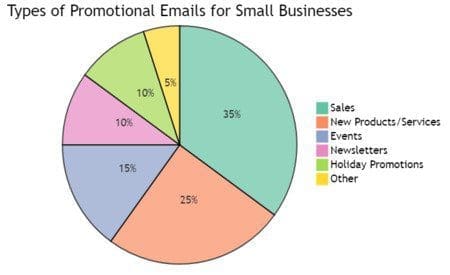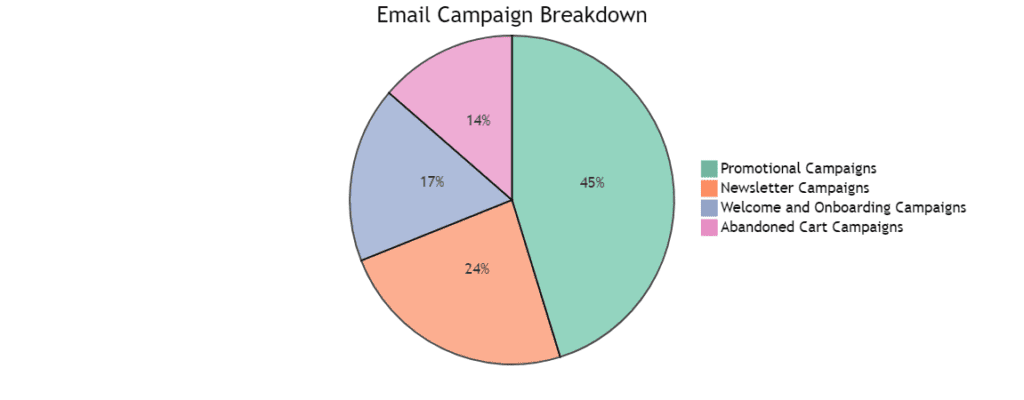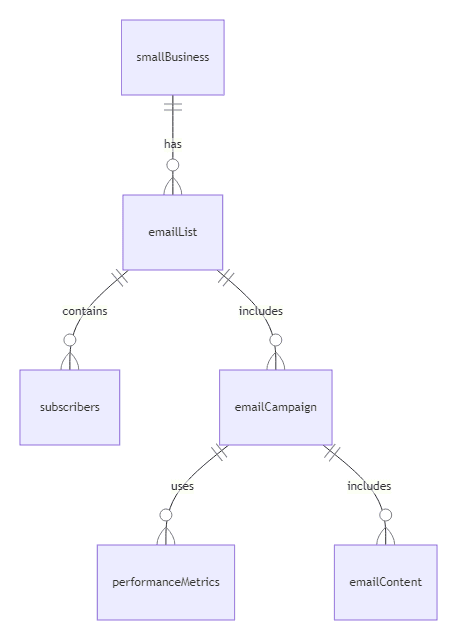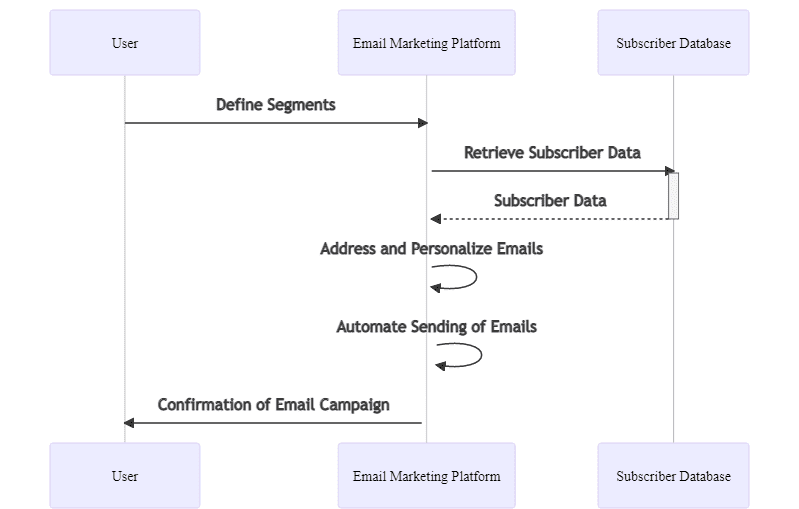Email Marketing for Local Businesses: Best Email Marketing Strategies
You’ve just walked into your favorite local coffee shop, and as the friendly barista hands you your steaming cup of morning bliss, you notice a small sign inviting you to join their email list for exclusive discounts and updates. Intrigued, you quickly sign up, realizing that this is a prime example of email marketing for local businesses in action. As a local business owner yourself, you’re eager to harness the power of this simple yet effective marketing strategy to drive sales and build customer loyalty. Well, you’re in luck! Here are the essential steps to embark on your email marketing journey.
Definition of Email Marketing

Growing a small business means turning website visitors into email subscribers.
Email marketing is a powerful tool that allows owners of small businesses to communicate directly with their customers and prospects via email. By creating targeted and engaging campaigns, businesses can build relationships, promote products and services, and boost customer loyalty. The best email marketing plans are tailored to the unique needs and goals of each small business, making it an invaluable marketing channel.
Importance of Email Marketing for Small Businesses
In today’s fast-paced digital ecosystem, email marketing for small businesses is more important than ever. It offers numerous benefits, such as:
- Cost-effectiveness: Email marketing campaigns can be executed with relatively low overhead compared to traditional marketing channels, making it accessible for small businesses with limited budgets.
- High return on investment (ROI): Research shows that email marketing consistently delivers impressive returns, with an average ROI of $42 for every $1 spent.
- Personalization: Small business owners can create customized email marketing campaigns that cater to their audience’s interests and preferences, resulting in higher engagement rates.
- Measurable results: Email marketing platforms provide in-depth analytics, enabling businesses to track the performance of their campaigns and optimize them for even better results.
- Increased customer retention: By nurturing relationships with existing customers through email, businesses can encourage repeat business and foster customer loyalty.
Purpose of this Article
This comprehensive guide aims to provide small business owners with the knowledge and tools needed to develop a successful email marketing plan. From selecting the right email marketing platform and building an email list to crafting the perfect email template and analyzing campaign performance, we’ll cover everything you need to create effective campaigns that grow your business.
Benefits of Email Marketing for Small Businesses
Email marketing is a versatile and powerful tool that can benefit small businesses in numerous ways. Let’s explore some of the key advantages it offers:
Cost-effective Marketing Solution
One of the most attractive aspects of email marketing is its cost-effectiveness. Unlike traditional advertising methods, which often require a significant investment, email marketing allows small enterprises to reach a large audience at a fraction of the cost. By selecting the best email marketing service for your specific needs, you can create and manage targeted campaigns on a budget, ensuring a high return on investment.
Targeted Audience

Types of Promotional Emails for Small Businesses
Email marketing enables you to reach a highly targeted audience, ensuring that your message reaches the right people at the right time. By segmenting your email list and creating tailored campaigns, you can deliver relevant content and offers to specific groups of subscribers, increasing engagement and conversion rates. This targeted approach allows for more effective marketing efforts, ensuring that your message resonates with your audience.
Increased Brand Recognition
Regularly sending well-crafted and visually appealing email newsletters can help establish and strengthen your brand identity. By incorporating your logo, brand colors, and a consistent design aesthetic, you can create a cohesive and memorable experience for your subscribers. This increased brand recognition can lead to higher customer loyalty, repeat business, and word-of-mouth referrals.
Improved Customer Engagement
Email marketing provides an excellent opportunity to engage with your customers on a personal level. By delivering valuable content, such as informative articles, product updates, or special promotions, you can nurture relationships and encourage interaction with your brand. Automated email tools, such as welcome emails and personalized product recommendations, can further enhance customer engagement and drive sales.
| Ways Email Marketing Improves Customer Engagement | Description |
|---|---|
| Personalization of Content | Targeted and relevant emails create a more personalized experience for the customer. |
| Two-way Communication | Use your email to initiate and respond to customer inquiries, feedback, and complaints. |
| Encourages Repeat Visits | Regular email communications can keep customers engaged and returning to your business. |
| Provides Value-Added Content | Valuable and informative content in emails can keep customers interested and engaged. |
| Call to Action | Effective emails can encourage customers to take action, such as making a purchase or signing up for a service. |
Measurable Results
One of the greatest advantages of email marketing is the ability to measure and analyze campaign performance. Most email service providers offer in-depth analytics, allowing you to track essential metrics such as open rates, click-through rates, and conversion rates. By monitoring these key performance indicators, you can identify trends, optimize future campaigns, and make data-driven decisions to improve your email marketing approach.
Example: A local bakery started using email marketing to send out weekly newsletters with special offers and updates on new products. Within a few months, they saw a significant increase in customer engagement, repeat business, and overall sales.
Choosing the Best Email Marketing Service for Small Businesses
Selecting the right email marketing service is crucial for the success of your small business. In this section, we’ll discuss the factors to consider when choosing an email marketing provider, highlight some of the best options available, and provide a comparison of their pricing and features.
Factors to Consider When Choosing an Email Marketing Platform
When evaluating email marketing software for your small enterprise, consider the following factors:
- Ease of use: The platform should be user-friendly and intuitive, allowing you to create and manage email campaigns with minimal effort.
- Features: Look for features such as marketing automation, segmentation, and integration with other marketing tools and software.
- Pricing: Compare pricing plans and ensure that the service offers a good balance between cost and value.
- Customer support: A responsive and knowledgeable support team can be a lifesaver when you encounter issues or need guidance.
Best Email Marketing Software for Local Companies
Here is some top email marketing software that caters to the unique needs of small businesses and startups:
- Mailchimp: A popular choice for businesses of all sizes, Mailchimp offers a user-friendly interface, marketing automation tools, and a generous free plan for those just starting out.
- Sendinblue: Known for its powerful automation features, Sendinblue is an excellent option for local businesses looking to automate their campaigns.
- Constant Contact: With an easy-to-use interface and robust customer support, Constant Contact is a reliable choice for local business owners who need a little extra help.
- GetResponse: GetResponse is an all-in-one marketing software that offers email marketing, automation, and landing page creation, making it a versatile option for growing businesses.
Pricing and Features Comparison
To help you make an informed decision, here’s a brief comparison of the pricing and key features offered by the email services mentioned above:
| Service | Starting Price | Marketing Automation | Segmentation | Landing Pages | Integrations |
|---|---|---|---|---|---|
| Mailchimp | Free | Yes | Yes | Yes | Yes |
| Sendinblue | Free | Yes | Yes | Yes | Yes |
| Constant Contact | $20/month | Yes | Yes | Yes | Yes |
| GetResponse | $15/month | Yes | Yes | Yes | Yes |
Ultimately, the email marketing platform that is best for your small company depends on your unique needs, budget, and preferences. By considering the factors mentioned earlier and comparing the features and pricing of popular services, you can make a well-informed decision that will help your business thrive in the digital landscape.
Example: A small online clothing store evaluated several email providers based on factors like ease of use, pricing, and automation features. They finally chose a provider that offered the best combination of these factors, which allowed them to create personalized and targeted campaigns that boosted their sales.

Breakdown of the most common types of emails.
Developing a Small Business Email Plan
A well-crafted email marketing plan is essential for small businesses to succeed in the digital world. In this section, we’ll discuss how to set marketing goals, build a list of subscribers, create engaging content, personalize campaigns, and test and optimize your email efforts.
Setting Marketing Goals
Before diving into email marketing, it’s crucial to establish clear and measurable goals for your campaigns. These goals might include increasing website traffic, boosting sales, or nurturing customer relationships. By identifying your objectives, you can tailor your email marketing campaigns to align with your business needs and measure their success.

The relationship between a small business, email marketing service provider, email list, and subscribers.
Building a Subscriber List
Growing a quality subscriber list is a vital step in developing a successful email marketing process. Here are some tips to expand your list:
- Create an enticing lead magnet: Offer valuable content, such as an eBook or a discount, in exchange for email addresses.
- Add sign-up forms to your website: Place user-friendly sign-up forms on your website to encourage visitors to subscribe.
- Promote your newsletter on social media: Share your email content on social media and encourage followers to join your list.
Remember, it’s best to build your list organically, focusing on subscribers who are genuinely interested in your products or services.
Creating Engaging Email Content
Crafting compelling email content is critical for keeping subscribers engaged and maintaining a positive sender reputation. Here are some tips for creating captivating content:
- Use attention-grabbing subject lines: Encourage subscribers to open your email with intriguing and relevant subject lines.
- Mix promotional and informational content: Strike a balance between promotional emails and value-driven content that educates or entertains your audience.
- Optimize for mobile devices: Ensure that your emails are easy to read and interact with on various devices, especially smartphones.
Personalizing Email Marketing Campaigns
Personalization can significantly improve the effectiveness of your email marketing campaigns. Use subscriber data to tailor your content and make your emails more relevant to individual recipients. Here are some personalization ideas:
- Address subscribers by name: Include the subscriber’s name in the email greeting to establish a connection.
- Send targeted promotions: Use segmentation to send tailored offers and promotions to specific groups based on their interests or purchase history.
- Celebrate special occasions: Send personalized emails to acknowledge subscribers’ birthdays or anniversaries.
Testing and Optimizing Email Campaigns
Testing and optimizing your campaigns are essential for maximizing their performance. Here are some tips for improving your email marketing efforts:
- A/B test various elements: Test subject lines, headlines, images, and call-to-action buttons to determine which versions resonate best with your audience.
- Analyze campaign metrics: Track open rates, click-through rates, and conversion rates to measure campaign performance and identify areas for improvement.
- Adjust send times: Experiment with different send times to discover when your audience is most likely to engage with your emails.
| Metrics to Measure Email Campaign Performance | |
|---|---|
| Metric | Description |
| Open Rate | The percentage of recipients who opened your email |
| Click-Through Rate (CTR) | The percentage of recipients who clicked on a link within your email |
| Conversion Rate | The percentage of recipients who completed a desired action, such as making a purchase or filling out a form |
| Bounce Rate | The percentage of emails that were undeliverable and returned to the sender |
| Unsubscribe Rate | The percentage of recipients who opted out of receiving future emails from your business |
Example: An independent bookstore decided to build an email list by offering a 10% discount on the first purchase for new subscribers. They created engaging content like book recommendations, author interviews, and event announcements. They also personalized their campaigns based on customer preferences and frequently tested different subject lines and call-to-actions to optimize their campaigns.
Developing a Small Business Email Plan
Creating an effective email marketing plan is essential for small businesses looking to nurture relationships with their customers and drive sales. Here’s a step-by-step guide to help you develop a prosperous email marketing strategy.

Creating email campaigns that are best for your business involves various steps.
Setting Marketing Goals
Before diving into your email marketing efforts, it’s crucial to set clear, measurable goals. These goals will serve as a roadmap for your campaigns and help you gauge the success of your email marketing initiatives. Examples of marketing goals include:
- Increasing website traffic
- Boosting sales and revenue
- Improving customer retention and loyalty
- Growing your email list
- Raising brand awareness
Personalizing Campaigns
Personalization can significantly improve your email marketing performance. Here’s how to personalize your campaigns:
- Segment your subscribers based on factors like demographics, behavior, or purchase history.
- Address your subscribers by their first name in the email subject line or body.
- Tailor your content and offers based on the preferences and needs of each segment.
- Use email automation to send timely, relevant emails based on specific triggers or actions.

Email subscribers and customers’ open rate goes up with personalization.
Testing and Optimizing Email Campaigns
Continuously test and optimize your email campaigns to ensure they’re achieving your marketing goals. Some best practices include:
- A/B test different subject lines, content, CTAs, or send times to see what resonates best with your audience.
- Monitor key performance indicators (KPIs), such as open rates, click-through rates, and conversion rates, to gauge the effectiveness of your campaigns.
- Adjust your email strategy based on the insights gained from your tests and analysis.
By following these steps, you can create a robust local business email marketing strategy that drives results and helps your business grow.
In conclusion, email marketing is an invaluable tool for businesses looking to connect with their audience, drive sales, and grow their brand. By setting clear marketing goals, building a robust email list, crafting engaging content, personalizing your campaigns, and continually testing and optimizing your efforts, you can create a powerful email system that delivers real results. Remember, success in email marketing doesn’t happen overnight, but with dedication, persistence, and the right approach, you’re well on your way to reaping the many benefits this powerful marketing method has to offer. So go ahead, take the leap, and watch your small business soar!
FAQs
Do I need permission to send marketing emails?
Yes, you need permission to send marketing emails to your recipients. This is a crucial aspect of email marketing, as it ensures you comply with privacy regulations, such as the General Data Protection Regulation (GDPR) and the CAN-SPAM Act. Permission-based marketing involves obtaining consent from subscribers before sending them promotional emails.
Is email marketing effective for local businesses?
Email marketing can be an essential tool for local businesses to build relationships with their customers, promote special offers, and keep them informed about events and updates. By targeting local customers with relevant content, local businesses can increase customer loyalty and drive foot traffic to their stores or online presence.
Is it illegal to send marketing emails?
Sending marketing emails without permission or not complying with email marketing regulations can be illegal. In the United States, the CAN-SPAM Act outlines specific requirements for commercial email messages, such as including an unsubscribe mechanism and accurate sender information. In the European Union, the GDPR imposes strict rules on data protection and privacy, requiring explicit consent from recipients before sending marketing emails.
Can I do bulk email marketing from my Gmail or Outlook?
Using Gmail or Outlook for bulk email marketing is not recommended, as these services have sending limits and are not designed for managing email campaigns. Email providers offer specialized tools, better deliverability, and features tailored for bulk campaigns, making them a more suitable option for this purpose.
Can email marketing help with SEO?
Email marketing does not directly impact SEO, as search engine algorithms primarily focus on website content and user experience. However, email marketing can indirectly support SEO efforts by driving traffic to your website, increasing user engagement, and promoting content that attracts backlinks. These factors can contribute to improved search engine rankings.
